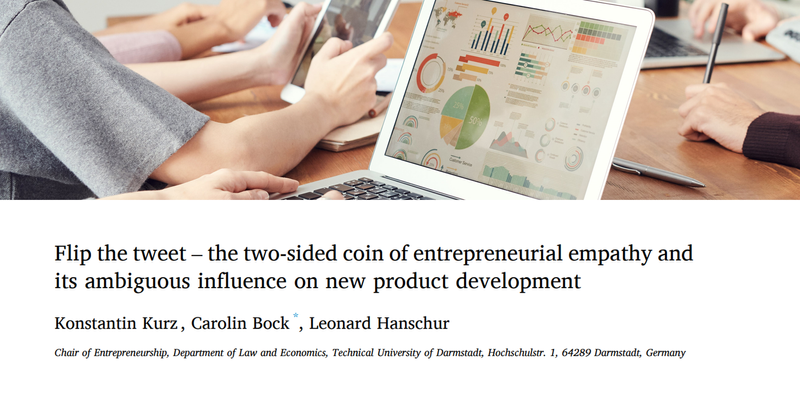New Research in the Field of Entrepreneurship: The Ambivalence of Empathy
Is empathy uniformly a good thing for entrepreneurs? The emergenCITY publication in the renowned Journal of Business Venturing reveals surprising research results.
Is empathy uniformly a good thing for entrepreneurs? The emergenCITY publication in the renowned Journal of Business Venturing reveals surprising research results.

The team around Konstantin Kurz, Leonard Hanschur and emergenCITY-Professor Carolin Bock from the Chair of Business Administration at the Technical University of Darmstadt presents a surprising research paper in the prestigious Journal of Business Venturing. The publication entitled “Flip the tweet – the two-sided coin of entrepreneurial empathy and its ambiguous influence on new product development” takes a critical look at the predominantly positive view of empathy in entrepreneurship to date.
The researchers were able to show that – contrary to the previous literature on entrepreneurship – empathy does not only have consistently positive effects. Instead, they present a perspective of ‘too-much-of-a-good-thing’ and develop a novel model of the mechanisms of entrepreneurial empathy.
The model is based on the analysis of extensive data from 4425 entrepreneurs. A central aspect of the research was the use of state-of-the-art machine learning methods analyzing millions of Twitter (X) tweets from entrepreneurs. The team found that empathy influences new product development in an inverted U-shaped pattern. While a certain level of empathy is helpful in understanding customer needs, too high levels of empathy can induce cognitive biases among entrepreneurs that outweigh the benefits of customer understanding and lead to inhibited product launches.
The results of the study suggest that entrepreneurial empathy should be considered an important but highly ambiguous success factor in entrepreneurship and thus contributes to a more balanced understanding of entrepreneurial empathy. At the same time, the researchers were able to show how AI-based big data methods enable an unobtrusive analysis of entrepreneurial personalities and activities. This may also inspire other entrepreneurship researchers to add these powerful innovative methods to their methodological armory.